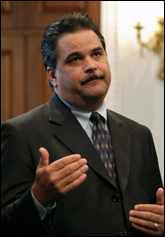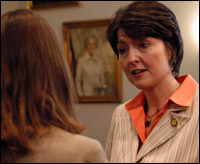
Rep. Richard Pombo meets the press in April.
Photo: U.S. House of Representatives.
You have to want to get to Nacogdoches, a Texas town that’s not on the way to anywhere. This eastern outpost, nearly 150 miles from Houston, is the oldest town in the state, with enough lore to fill volumes. It’s the site where, in the 1700s, the legendary Father Margil struck a rock twice during a drought and water flowed. In 2003, the space shuttle Columbia disintegrated overhead. And in late July, the town served as the perfect out-of-the-way location to host a congressional hearing on the National Environmental Policy Act.
That landmark legislation, signed by President Nixon in 1970, requires federal agencies to study and disclose the environmental effects of major projects on public land. It also stipulates that the decision-making process for such projects must include the opportunity for public comment. The three-page law enshrines caution.
But lately, NEPA has come under fire. In April, Rep. Richard Pombo (R-Calif.), chair of the House Committee on Resources, created a congressional “task force on improving” the act. Through a series of six regional hearings, the task force is reaching across America to hear comments before issuing a report in the fall.
But while NEPA strives to bring every concerned party to the table, observers say these hearings do not. They are being held in obscure locations, at odd times, and with little advance warning. Witnesses are handpicked, with the lineup revealed on the task force’s website only days before each event, a move some critics see as an attempt to stifle debate.
“They have decided to have a birthday party where they invite the guests they want,” says Carl Pope, executive director of the Sierra Club. “They want to hear what they want to hear.”
Participants say the first session, held in Spokane, Wash., in April, yielded support for the act. The Earth Day-weekend event, publicized locally by community groups, drew 175 people, many wearing stickers that read, “I Support NEPA: Democracy in Action.” Task-force member Rep. Jay Inslee (D-Wash.), who led the hearing with task-force chair Rep. Cathy McMorris (R-Wash.), says he thinks some of his colleagues were shocked by the results. “I think what I observed in Spokane, much to [Pombo’s] surprise, was an overwhelming support by the American public that their government fairly looks at their actions,” says Inslee.

Rep. Cathy McMorris is listening.
Photo: U.S. House of Representatives.
According to Inslee, Pope, and others, the strategy shifted after Spokane. The next hearing’s venue was changed several times before it was held in Lakeside, Ariz., on June 18. The Nacogdoches hearing was also moved, from Houston; and an early-August hearing, the most recent, was moved from Albuquerque to Rio Rancho, N.M. — and held at 10 a.m. on a Monday.
Representatives from the Sierra Club and the Center for Biological Diversity were invited to testify in Arizona, but only a few days prior to the hearing; they were given one day to prepare and submit their comments. The event also conflicted with a long-planned dam-decommissioning celebration deemed a NEPA victory. “Given the impossible deadline … both groups had to decline, but offered written testimony a few days later for the record,” says Neha Bhatt, a Sierra Club representative in Washington, D.C.
As a result, no environmentalists testified in Arizona. Who did speak? Representatives of the forestry, cattle, construction, mining, and energy industries. Now, says Bhatt, “The task-force website makes a point to say we were invited to testify, but didn’t. They don’t give the public access to [our written testimony]. It’s frustrating.” She adds that the Sierra Club asked to testify at the hearing in Nacogdoches, but was not invited.
Rep. Tom Udall (D-N.M.), the task force’s ranking member, didn’t attend the Texas hearing either. He said he received only two weeks’ notice. Like most politicians in Washington, his schedule is planned months in advance, and he had commitments in his home state. “It’s helpful to have [the hearings] in communities out in the country,” Udall says, “but the task force needs to be better at publicizing where they will be and including all people who have a stake in this issue.”
The Nacogdoches hearing was hosted by McMorris and Rep. Louie Gohmert (R-Texas) in a concert hall at Stephen F. Austin State University. After an invocation asking God for protection for Gohmert and his family, and the singing of the national anthem, the invited witnesses got down to business in front of an audience of about 70 people. (Members of the public, while welcome to attend the hearings, can submit only written comments.)
The panel of witnesses consisted of seven industry representatives and two environmentalists: Larry Shelton, a trustee from the Texas Committee on Natural Resources, and Sandra Nichols, a staff attorney with WildLaw in Montgomery, Ala. Shelton said NEPA did not need to be changed. But Nichols said “real solutions” were needed to make the law more effective. She added that environmental groups were urged by Rep. Joe Barton (R-Texas) “to come out of the trenches” and meet halfway. That’s what she hoped to accomplish at the hearing, she said.
Representatives for the oil, mining, and timber industries spoke about economic interests and the interference caused by too many regulations. As Victor Carrillo, the state’s railroad commissioner, put it, “When the federal government does pass a law or regulation, it should be simple, clear, understandable, limited in scope, reasonable, practical, and pass the commonsense test.”
Common sense — and the notion that NEPA lacks it — was the theme here, along with the general agreement that too much environmental assessment and too many stakeholders result in lawsuits and red tape. “NEPA doesn’t sit on a pedestal that can’t be touched,” Gohmert said.
When asked about the selection of witnesses, McMorris said the NEPA hearings are intended to offer a better understanding of the 35-year-old law and its economic impacts. “We don’t need to have 10 people say nothing needs to be improved,” she said. “We want to hear from the people who have problems with NEPA.” That kind of comment disturbs Inslee. “Right before [Pombo] created this task force, right out of the gate, the chairman tried to strip NEPA and reduce it in the energy bill,” he says. “That diminishes the effectiveness of this task force. It has not been very effective at getting a broad perspective of Americans. It’s a dud in that regard.”
Many people believe NEPA is sound legislation. Oliver Houck, who directs the environmental-law program at Tulane University’s law school, cannot imagine what the task force’s fuss is about. “NEPA [instituted] one very simple, modest device,” says Houck. “It didn’t shut down anything, didn’t set up a review board. It just required an environmental impact statement. A more modest requirement would be hard to imagine.”
Rep. Wayne Gilchrest (R-Md.), a well-known conservationist who has received accolades from several environmental groups, sits on the Resources Committee with Pombo but is not a task-force member. While he believes NEPA’s application may need to be more logical — a conclusion also reached by a NEPA “modernization” task force created in 2002 by the White House Council on Environmental Quality — he says the law allows for innovation, a crucial component as the world faces global warming. With innovation comes ingenuity and intellect, he adds: “NEPA expands those characteristics. If you shut down NEPA, you lose that.”
Some environmental advocates predict the real battle will begin next year, when NEPA-weakening legislation will almost certainly be introduced. If the act is gutted, they say, it might mean the very result Pombo seeks to avoid: more lawsuits. “When we aren’t listened to by the government, we have the right to legally challenge,” says Bianca Encinias of the Southwest Network for Environmental and Economic Justice. “Our communities have a right to know, and a right to participate.”


